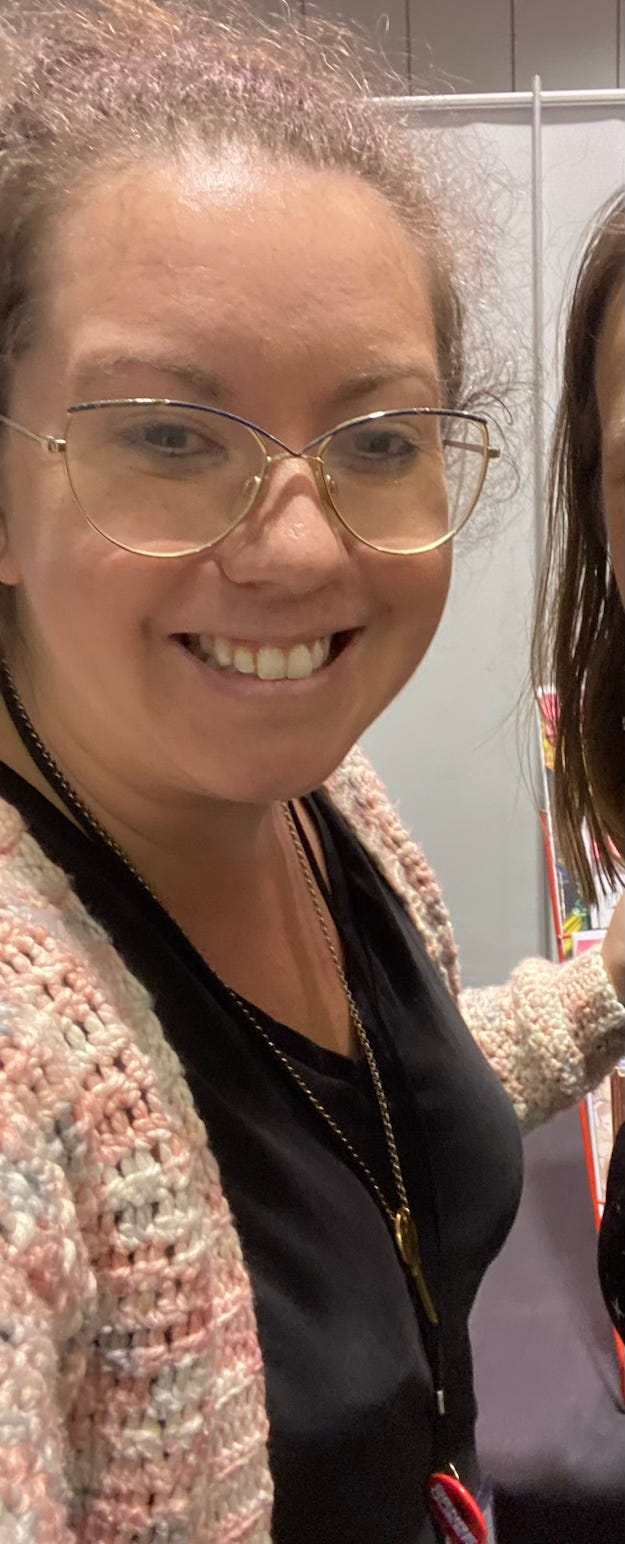State of the Industry: TV/FILM
TABLE OF CONTENTS
Why Does Everything Feel Like Shit?
(Brief) Hollywood History Lesson
FUTURESCAPE
So What Do I Do?
Final Caveat
The Crochet Report
* PERSONAL NOTE: Thank you everyone for the kind responses to my personal news last week. Everyone’s responses on Facebook/Instagram/Twitter were so respectful, avoiding mention the word ‘marriage’ which managed to keep the news private. I’ve been holding this close to my chest, because it’s such a beautiful, personal thing for me and my spouse. Being able to share with you and feel respected has been an absolute blessing. You’re all wonderful.
Now. To Business.
WHY DOES EVERYTHING FEEL LIKE SHIT?
As we covered last week, it’s not you. Things absolutely feel like the worst it’s ever been. Because, for many of us in Film and TV, that’s true! Scroll through Screenwriting Twitter or Reddit. Look up your favorite TV writers. Talk to friends— Everyone is moaning right now. It feels like the death of everything.
So, what happened?
I won’t get too in the weeds of how things in Film and TV work, there are plenty of other people on Substack with excellent newsletters that go into more detail.
But, to hilariously oversimplify, Hollywood doesn’t have any money.
“But Meghan, movies make so much money! Deadpool and Wolverine made over $1 billion! How could Hollywood not have money?” A fair question, one that I hear quite often. I especially heard this kind of thing during the strike from other folks not in TV/Film or folks in other countries: “Don’t you guys make loads of money?”
It’s a really complicated answer. For the owners of Warner Bros, Disney, Sony, etc. the answer is yes. But for the rest of the entertainment industry, the people who actually make the movies, the ultimate answer is no. But the paycheck doesn’t often appear that way, much like a box office budget.
I wrote a whole part in this newsletter going into the box office numbers of 2024, analyzing them and comparing them, and frankly found it boring. The numbers boiled down to this: sequels to IP franchises are the only movies in 2024 making enough money to keep the lights on in LA.
The movie business is a big business, with global box office revenue reaching a record $42.5 billion in 2019. But this huge figure doesn't mean that all movies are money makers; in fact, many movies end up being losing bets. - Investopedia.com
TV isn’t much better — few networks (places like ABC, NBC, CBS, etc.) are buying new shows that can’t guarantee eyeballs to their ad sales, so advertisers an advertisers have realized they’ll get a better bang for their buck if they go to the socials. (Read about Ken Ziffren’s recent annual lecture to the Entertainment lawyers if you want to thrust yourself into an anthill.) And don’t get me started on the Streaming Services.
How did that happen? How did Hollywood rise to such high monetary highs and now descend into concerning financial lows?
Frankly? Progress. Which is also what will save Hollywood. Just like last time. And the time before that.
(BRIEF) HOLLYWOOD HISTORY LESSON
Let’s talk about the many Bankruptcies and Deaths of Film/TV in Hollywoodland.1
1930s - The Great Depression. A hellacious time for the US in every industry, but specifically for the new upstart — Hollywood. After a successful boom with silent films, studios were suddenly faces with extreme losses of income. Audiences were no longer going to movie theaters, because they just couldn’t afford it. Not for one silent film. So to survive studios innovated, creating new genres (such as gangster films), adopt double features, and embrace the brave new world of “Talkies”.
1950s - After a solid two decades of being top dog, there’s a new kid in town — TELEVISION. It was expensive, modern, and brought the world right into your living room. And it absolutely terrified Hollywood. With a TV in the living room, audiences won’t go see movies anymore! But… we still have movies 70 years later. So, what happened? Hollywood innovated once again, with new technologies like Cinemascope and 3D films. These spectacular films couldn't be experienced on a small TV screen.
1980s - Another couple decades of quiet as the Vietnam War took center stage. But as the 80s found a renewed sense of calm, Hollywood once again had a new villain: Home Video. In fact, the creation of Home Video led to a writer’s strike in 1984 over Pay TV and Home Video royalties. The fear from studios was that if audiences could purchase movies, why would they go to the theater? But, instead of killing film, it helped finance it, ultimately leading to a new revenue stream for studios and expanded the market for films.
1990s - Early ‘90s had a recession, putting a strain on finances yet again. But the recession led studios to cut costs, focusing on lower-budget films, laying off folks, delaying or canceling projects. Sound familiar?
Which leads us to the 2000s. From the 2008 Financial Crisis (not to mention a Writer’s Strike), rise of streaming TV, a Global pandemic, and Venture Capital takeover, you’re pretty much caught up.
In almost every instance, progress heralded the end of Film and TV. But also, it was progress that brought us back from the brink of death.
Film and TV will never die. But they will change. They will progress. The trick is to persist, to grow, and to anticipate.
FUTURESCAPE
But how can you anticipate when the future of TV and Film is about as clear as looking out the window of a train in the middle of a rainstorm.
True, things are enigmatic at the moment, but allow me to make some predictions on Film and TV in the next ten years.
Global Industry - I’ve been preaching this for quite some time and we’re starting to see it. Film and TV production have almost completely moved out of LA, union rates are high in the US due to high cost of living so studios are outsourcing, and, frankly we are ready for more new voices from structure that isn’t informed by ads.
Independent Film and TV - We’re seeing a bit of this in other areas like animation, which I’m discussing next week. (The only reason animation is not included with Film and TV is because The Animation Guild is in the middle of negotiations, which deserves a whole separate newsletter.) Now more than ever, Audiences are hungry for content, and they are willing to support the creators who make the content they love. That doesn’t mean you can just launch a kickstarter without doing your research, but as studios and networks tighten their belts, the best course of action is to make your own stuff.
Everyone’s an Entrepreneur - This flows in a bit with the above, but the 2030s are going to shift almost entirely to gig economy. Which means everyone’s a business. Some people like that, but most of us (including me) hate that idea. However, until countries value people over companies, this will not change.
AI - The dreaded AI conversation. Let me cut to the chase and tell you, AI is not taking creatives’ jobs. Oh, sure, for the first couple years we will see AI-”written” movies and TV. But once AI becomes a part of the next wave of technology (and it will, you can’t put the toothpaste back in the bottle), it isn’t the writers, directors, artists, etc. that will lose their jobs. Much like automation decimated the factories, AI will eradicate the “entry” level jobs. The once bustling studios will become much quieter, as the studios and networks become forced to operate on a quarter of the staff they once had and training opportunities will be erased.
Focus on Craft - As all the above changes become implemented throughout studios and networks, a real value will be placed on craft. Again, going back to the factories of the early 1900s, after woodworking became automated, craftsmanship bloomed. Consumers learned to value quality woodwork because the factory made chairs were so basic.
“But Meghan, what do I do right now?” A great question…
SO WHAT DO I DO?
This is something everyone from studio execs to showrunners to PAs are asking. If you’re established, how do you not lose your standard of living? If you’re not established, how do you make a name for yourself and get the dream job?
If you’re established, you’ll be okay. And if you’re not established, you will also be okay though maybe not in Film and TV.
But if you want to remain in the Film and TV, you need to take the next ten years into consideration.
Global Industry - You don’t need to be in LA anymore. I can’t believe I’m saying this, because I was such a stalwart LA Truther. And for writing, that is still somewhat the case. But only somewhat. For other aspects of the industries, it might be better to live in other places. If you think of Film and TV as a skill, you realize that skills can transcend location.
Side note - A UK friend mentioned that she’s only heard US folks say, “Survive until ‘25.” Meanwhile, in most countries, things are actually picking up. Looking outside of LA and learning how to operate in other' countries’ Film and TV industry is crucial for the next ten years.
Independent Film and TV - Investigate Kickstarter, Indiegogo, and Patreon. Research and apply for grants. Don’t wait for Hollywood, BBC, CBC, anyone to come to you. Ensure you have people around you who are both brutally honest and unwavering fans who will help encourage you and while also telling you the truth. Look into co-ops with other writers, other actors, other directors, where you can join together to help each other make short films, pilots, etc.
When it comes to crowdfunding, I highly recommend having a proof of concept to show your potential audience and get them on board. That includes a short film, a scene, anything. I don’t just mean written, but also show your hand at what you have.
Everyone’s an Entrepreneur - Chat with a financial advisor about your options to make yourself either an LLC or an S Corp, keeping in mind you might not make money in the first year. Most financial advisors will have a free session up front to chat about your options. But you need to start your own business now. If you’re an actor, operate like you’re a production company for your brand as an actor. If you’re a writer, operate like you’re a studio for your projects. Research directors and actors, make friends, nail down what your most obscure and niche interests are and reach out to others that have that same interest.
Pro Tip: I’ve made different secret Instagram accounts to keep track of different artists I like. This is a great option for directors, writers, and actors as well.
AI - Listen, keep fighting for AI regulation. I think most people know it isn’t going anywhere. Perhaps the best thing we can do in the next decade is to treat AI like a parent trying to get their kid not to drink - take all the power out of it*. AI is an extremely boring thing that is not the magic answer to life’s problems. It’s a tool, one that needs to be well regulated, but ultimately a very boring tool.
*A better phrase here is the British “take the piss out of it”, but I tried to translate it to be a bit more American.
Focus on Craft - When I first started working in Film and TV back in 2015, there were men who said to my face that it was hard for white men in Hollywood. I’m sure they felt that way, but what they meant was: it was hard for mediocre white men. (I know they were mediocre, because I read their scripts.) This is going to become true for all of us. It will be hard for mediocre creatives. Mediocrity will be your death knell. Grow. Go to classes. Read books. Talk talk talk talk talk about craft. The only way to survive is by being truly inspired by the magic of cinema, and an absolute nerd about what makes good Film and TV.
FINAL CAVEAT
You may have noticed I didn’t say something like “make comics” or “make a podcast”. Frankly, you should already be thinking about that, but also there are so many people that think it should be “easy” to “jump down” into comics or audio drama. In fact, some people think animation is even “jumping down”. I assure you, not only is that incorrect, it’s incredibly damaging. Each medium has it’s own craft.
I want everyone to be making the things I love, I want you to check in and make sure you’re writing because of the love of the thing, not because you’re feeling desperate.
You will be okay. Don’t bring your fears and baggage into someone else’s industry without seeing the value in that industry first.
THE CROCHET REPORT
So, even the crochet project I’m working on is redacted. In this case, it’s a gift for a friend who does not know I’m making this for them. I will say it’s another little figure, and I will also say that the coat for this little figure is proving to be the bane of my existence.
So instead of pictures of this project, I will show you a cropped photo of me at WonderCon in a sweater I made earlier this year. (Cropped because I didn’t get the person’s permission to post their face.)
I’m really proud of this sweater, I used yarn I found from a wool dyer on TikTok named Arcane Fibre Works. I enjoyed using the more chunky yarn, and, one again, I forgot to save the pattern. This one I have more hope finding, but it’s an oversized sweater that was very cozy in the colder months. I really like the border along the edges and around the cuffs!
That’s all for this week! Next will be State of the Industry: Animation.
Have a great week!
Best,
Meghan
To be clear, I am just going through the history of Film and TV in the United States. Film and TV in other countries had a different history, but was often affected by the US. I think it’s incredibly important to recognize Hollywood is just one piece of a large, global Film and TV industry.











Honestly I find this post incredibly empowering. Thank you! And as someone who exists in the world of book publishing, this advice is pretty much just as applicable here too.